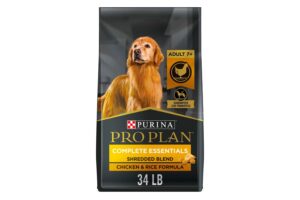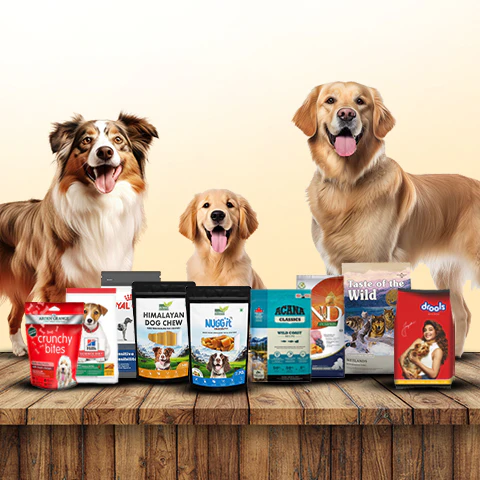The Best Dog Foods: A Comprehensive Guide to Keeping Your Furry Friend Healthy and Happy
As dog parents, we all want what’s best for our furry friends, and one of the most important aspects of their well-being is a balanced, nutritious diet. But with so many options available, it can be overwhelming to know which dog food is truly the best for your pup. From kibble to canned food, raw diets to fresh meals, the choices are endless. So, how do you navigate the world of the Best Dog Foods to ensure your pet stays healthy, energetic, and happy?
In this guide, we’ll help you understand what makes a great dog food, the different types available, and how to choose the best one for your dog’s unique needs. Let’s dive in!
What Makes the Best Dog Foods?
Before we explore the best dog foods on the market, let’s first look at what makes a dog food truly “the best.” Just like us, dogs require a balanced diet to thrive, and the food you choose can impact their energy, coat quality, digestion, and even their lifespan.
1. High-Quality Protein
Protein is essential for your dog’s muscle development and overall health. Look for foods where high-quality animal protein, such as chicken, beef, lamb, or fish, is the first ingredient. Avoid foods that list “meat by-products” or vague terms like “meat meal” as the primary protein source, as these can be lower quality.
2. Healthy Fats
Fats are vital for energy, healthy skin, and a shiny coat. Omega-3 and omega-6 fatty acids, commonly found in fish oils and flaxseed, are particularly beneficial for your dog’s health.
3. Digestible Carbohydrates
Carbs provide energy and help your dog maintain a healthy weight. Look for whole grains like brown rice, barley, and oats, or legumes like sweet potatoes. Avoid foods with excessive fillers like corn, soy, or wheat.
4. Added Nutrients
The best dog foods also contain a variety of vitamins, minerals, and antioxidants to support your dog’s immune system, bone health, and overall vitality. Ingredients like blueberries, spinach, and pumpkin can provide essential nutrients to your dog’s diet.
5. No Artificial Additives
Good dog food should be free from artificial colors, flavors, and preservatives. Look for natural preservatives like mixed tocopherols (Vitamin E) and avoid artificial additives like BHT, BHA, and ethoxyquin.
The Different Types of Dog Foods
Choosing the right type of dog food for your pet is just as important as selecting the right brand. Here are the most common types of dog food, each with its own benefits:

1. Dry Dog Food (Kibble)
Kibble is one of the most popular options due to its convenience and affordability. It’s shelf-stable, easy to store, and often comes in a wide range of formulas to suit different breeds, ages, and health needs.
Pros:
-
Affordable and convenient
-
Long shelf life
-
Helps with dental health by reducing plaque buildup
Cons:
-
Can be lower in moisture, which might not be ideal for dogs that don’t drink enough water
-
Some brands may use fillers or artificial additives
2. Canned Dog Food (Wet Food)
Wet food is another common option and is often more palatable for picky eaters. It contains more moisture, which can help keep your dog hydrated.
Pros:
-
More palatable for picky eaters
-
Higher moisture content
-
Easier to digest for some dogs
Cons:
-
More expensive than kibble
-
Shorter shelf life once opened
-
Can contribute to weight gain if not portioned correctly
3. Raw Dog Food
Raw diets are becoming increasingly popular as pet owners look to replicate a dog’s natural diet. Raw food typically consists of raw meat, bones, and vegetables, and some brands offer pre-packaged raw meals for convenience.
Pros:
-
High-quality protein
-
Mimics a natural canine diet
-
Supports coat health, energy, and digestion
Cons:
-
Can be costly
-
Risk of bacterial contamination if not handled properly
-
Needs careful balance to ensure proper nutrients
4. Fresh Dog Food
Fresh dog food is a relatively new option where meals are prepared with fresh, human-grade ingredients. These meals are often delivered to your door on a subscription basis.
Pros:
-
Made with fresh, whole ingredients
-
Tailored to your dog’s individual needs
-
No artificial preservatives
Cons:
-
Expensive compared to traditional options
-
Needs to be refrigerated or frozen
Factors to Consider When Choosing the Best Dog Food
When choosing the best dog food for your pet, it’s essential to consider several factors to ensure it meets their specific needs.
1. Age and Life Stage
Puppies, adults, and senior dogs all have different nutritional needs. Puppy food is typically higher in protein and calories to support growth, while senior dog food might have fewer calories and additional joint-support ingredients.
-
Puppy Food: Higher in calories and fat to support growth.
-
Adult Food: Balanced for maintenance and energy.
-
Senior Food: Lower in calories with joint support and digestive aids.
2. Breed Size
Smaller dogs and large breed dogs have different nutritional requirements. Small breed dogs often require calorie-dense food because they have higher energy needs in relation to their size. On the other hand, large breed dogs might need food designed to prevent joint issues, which can be common in large breeds.
3. Health Concerns
If your dog has a specific health condition, such as allergies, kidney disease, or obesity, you may need to choose a specialized food. There are many formulas available that cater to specific needs, like grain-free, hypoallergenic, or weight management diets.
4. Food Sensitivities and Allergies
If your dog has food sensitivities or allergies, look for foods with limited ingredients or hypoallergenic formulas. Common allergens include corn, soy, and chicken, so it may be helpful to choose food with alternative protein sources, like salmon, lamb, or duck.
Top 5 Best Dog Foods of 2025
Here’s a list of some of the best dog foods on the market based on quality ingredients, brand reputation, and overall nutritional value.
1. Royal Canin Size Health Nutrition (For Small Dogs)
Royal Canin is well-known for creating breed-specific diets, but their size-based formulas are great for all breeds. The Small Breed Adult Formula is perfect for little dogs with high metabolism. It contains easily digestible proteins and a precise blend of nutrients to support a healthy weight.
Pros:
-
Tailored to small dogs’ specific needs
-
Helps maintain weight and muscle tone
-
High digestibility
Cons:
-
A bit more expensive than some other brands
2. Hill’s Science Diet Adult Sensitive Stomach & Skin Chicken Recipe
Hill’s Science Diet is highly recommended by veterinarians. This formula is designed for dogs with sensitive stomachs and skin issues, offering easily digestible ingredients like chicken and rice.
Pros:
-
Easy on sensitive stomachs
-
Supports skin and coat health
-
High-quality protein
Cons:
-
Some dogs may not like the flavor
3. Blue Buffalo Life Protection Formula (For Large Breeds)
Blue Buffalo offers a variety of formulas, but their Life Protection Formula for large breeds stands out. With deboned chicken, brown rice, and wholesome vegetables, it provides excellent nutrition for big dogs, supporting joint health and muscle development.
Pros:
-
High-quality protein
-
Omega fatty acids for healthy coat and skin
-
Joint support for large breeds
Cons:
-
Higher price point
4. Wellness CORE Grain-Free RawRev High-Protein, Low-Carb
If you’re looking for a high-protein diet for your dog, Wellness CORE’s RawRev formula is a great option. This grain-free food is packed with turkey, chicken, and raw, freeze-dried meat pieces to deliver optimal nutrition.
Pros:
-
High in protein and low in carbs
-
Freeze-dried pieces for added flavor
-
Grain-free for sensitive dogs
Cons:
-
Expensive compared to other options
5. Orijen Original Dry Dog Food
Orijen is one of the best brands for high-quality, biologically appropriate food. Their Original formula features a variety of animal proteins, including chicken, turkey, and fish, making it an excellent choice for active dogs.
Pros:
-
High-quality, animal-based protein
-
No artificial preservatives
-
Supports lean muscle mass and energy levels
Cons:
-
Expensive for budget-conscious pet owners
Conclusion: Choosing the Best Dog Food for Your Furry Friend
Choosing the best dog food is an essential step in ensuring your pet’s long-term health and happiness. By considering your dog’s age, size, breed, and any health concerns, you can find a diet that suits their unique needs. Remember to prioritize high-quality protein, healthy fats, digestible carbohydrates, and added nutrients to support your dog’s well-being.
The brands mentioned in this guide, such as Royal Canin, Hill’s Science Diet, and Blue Buffalo, offer some of the best options available. Whether you choose kibble, canned food, raw, or fresh meals, the right dog food can make all the difference in keeping your pup healthy, happy, and thriving.
